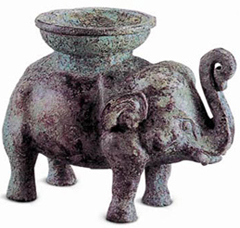
On April 22-23, a symposium entitled “The ‘New Scramble for Africa?’: Contemporary Formations Between China and Africa” brought scholars, journalists, and practitioners from the US and beyond to the MacMillan Center. The goal of the symposium, which was convened by Kamari Clarke, Chair of the Yale Council on African Studies and Professor of Anthropology; Haun Saussy, Chair of the Council on East Asian Studies at Yale and Bird White Housum Professor of Comparative Literature; and Jason Warner, Yale African Studies Master’s degree candidate, was to explore the implications of the recent rise in China’s economic, political, and military collaborations with various African actors. Subsidiary issues considered included: the political economy and global geo-politics of the China-Africa nexus; the politics of media representation; and the impact of these growing alliances on human rights, conflict, and the pursuit of resources on the African continent.
In the opening keynote address, Robert Rotberg, Director of the Program on Intrastate Conflict and Conflict Resolution, Belfer Center for Science and International Affairs at the Kennedy School of Government at Harvard University, offered a broad overview of the historical and contemporary underpinnings of the China-Africa relationship, emphasizing the enduring theme that collaborations between the two entities are “nothing new.”
The symposium panels explored in greater depth China’s engagement with the African continent, highlighting, on the one hand, what Timothy Webster, Senior Fellow at the Yale China Law Center and Lecturer-in-Law at Yale Law School, articulated as China’s often unpublicized promotion of social and economic rights and, on the other, its quest for resources and construction of infrastructure facilitating access to such resources, as demonstrated by Margaret Lee, Associate Professor of African and Afro-American Studies at the University of North Carolina-Chapel Hill. Nils Tcheyan, Senior Associate with the Africa Center for Economic Transformation, delved into the macro-economic prospects for African transformation. In a presentation based on fieldwork in Accra, Ghana, Stephanie Rupp, Assistant Professor in the Department of Anthropology at the City University of New York, discussed the ways in which survey respondents presented diverse views of Chinese involvement in the energy sector. While these respondents recognized the benefits of the Bui Dam, a hydro-electric project supported by a Chinese construction company, many expressed concern about Chinese involvement and vehemently opposed such involvement in the Jubilee Oil Field, on the grounds that China would simply promote its own interests and perhaps a kind of neo-colonialism. However, Muna Ndulo, Professor of Law and Director of the Institute for African Development at Cornell University, and Dunia Zongwe, PhD candidate at Cornell, both emphasized that it is the responsibility of African governments to establish and enforce compliance of Chinese companies with legal contracts in order to eliminate the possibility of the plunder of Africa’s significant mineral wealth.
In the concluding panel, Haun Saussy and Kamari Clarke highlighted the complexity of Chinese engagement with Africa. Various panelists and attendees had reminded the group of the need to disaggregate both “China” and “Africa,” examining the ways in which various actors are situating themselves within new alliances. Professor Clarke suggested that perhaps the only conclusive point was the need for further scholarly engagement. The symposium was made possible thanks to the support of the Yale Council on African Studies, the Council on East Asian Studies at Yale University, the Yale Center for Transnational Cultural Analysis, the Yale China Law Center, and the Edward J. and Dorothy Clarke Kempf Fund.
